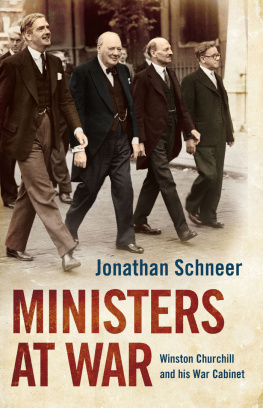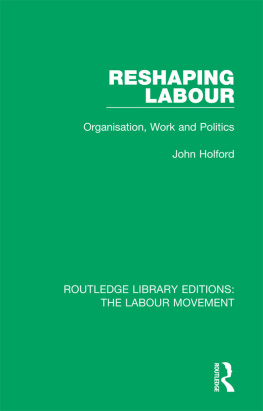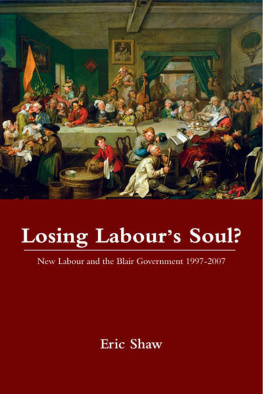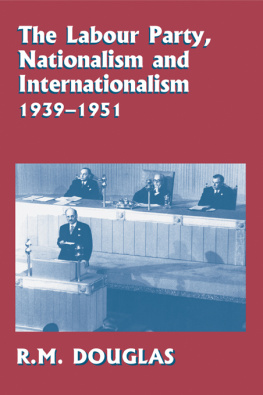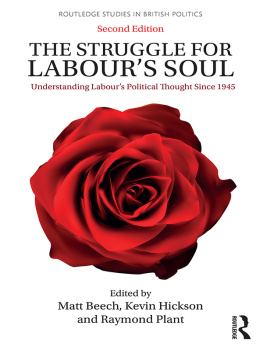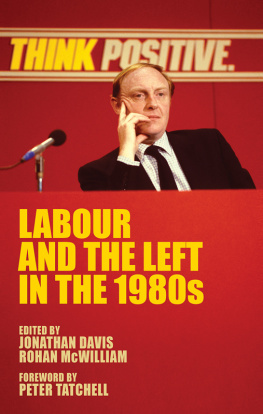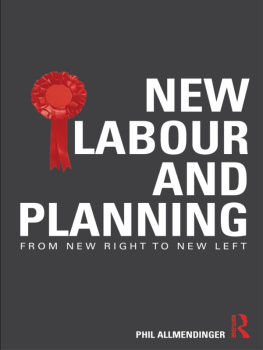ROUTLEDGE LIBRARY EDITIONS:
THE LABOUR MOVEMENT
Volume 30
LABOURS CONSCIENCE
LABOURS CONSCIENCE
The Labour Left,
194551
JONATHAN SCHNEER
First published in 1988 by Unwin Hyman
This edition first published in 2019 by Routledge
2 Park Square, Milton Park, Abingdon, Oxon OX14 4RN
and by Routledge
711 Third Avenue, New York, NY 10017
Routledge is an imprint of the Taylor & Francis Group, an informa business
1988 Jonathan Schneer
All rights reserved. No part of this book may be reprinted or reproduced or utilised in any form or by any electronic, mechanical, or other means, now known or hereafter invented, including photocopying and recording, or in any information storage or retrieval system, without permission in writing from the publishers.
Trademark notice: Product or corporate names may be trademarks or registered trademarks, and are used only for identification and explanation without intent to infringe.
British Library Cataloguing in Publication Data
A catalogue record for this book is available from the British Library
ISBN: 978-138-32435-0 (Set)
ISBN: 978-0-429-43443-3 (Set) (ebk)
ISBN: 978-1-138-33176-1 (Volume 30) (hbk)
ISBN: 978-0-429-44709-9 (Volume 30) (ebk)
Publishers Note
The publisher has gone to great lengths to ensure the quality of this reprint but points out that some imperfections in the original copies may be apparent.
Disclaimer
The publisher has made every effort to trace copyright holders and would welcome correspondence from those they have been unable to trace.
L ABOUR S
CONSCIENCE
THE LABOUR LEFT 194551
JONATHAN SCHNEER
Boston
UNWIN HYMAN
London Sydney Wellington
To my father
Contents
Jonathan Schneer, 1988
This book is copyright under the Berne Convention. No reproduction without permission. All rights reserved.
Allen & Unwin, Inc.,
8 Winchester Place, Winchester, Mass. 01890, USA
Published by the Academic Division of
Unwin Hyman Ltd
15/17 Broadwick Street,
London W1V 1FP
Allen & Unwin (Australia) Ltd,
8 Napier Street, North Sydney, NSW 2060, Australia
Allen & Unwin (New Zealand) Ltd in association with the Port Nicholson Press Ltd,
60 Cambridge Terrace, Wellington, New Zealand
First published in 1988
Library of Congress Cataloging in Publication Data
Schneer, Jonathan.
Labours Conscience.
Bibliography: p.
Includes index.
1. Labour Party (Great Britain) 2. SocialismGreat
Britain. 3. Great BritainPolitics and government19451964. I. Title.
JN1129.L32S36 1988 324.24107 87-17470
ISBN 0-04-942193-X (alk. paper)
British Library Cataloguing in Publication Data
Schneer, Jonathan
Labours conscience: the Labour Left, 194551
1. Labour party (Great Britain)History
I. Title
324.2410709 JN1129 L32
ISBN 0-04-942193-X
Typeset in 10 on 12 point Bembo by Word Capture, Salford, and printed in Great Britain by Biddles of Guildford.
Labours Conscience: The Labour Left, 194551 analyzes the attitudes and activities of a critical force in modern British politics during a period that proved decisive in the history of Labour and the British Left generally. Inevitably it emphasizes events in Westminster, but it attempts to indicate the role of the Labour Left in the trade unions and constituencies as well.
Perhaps I should state at the outset that I am aware of the difficulties in using the term Labour Left During 194551 the Labour Left never was an organized force. It had no formal membership. For the most part the men and women who may be said to have belonged to it considered themselves first and foremost members of the Labour Party. If they were critical of some of the policies laid down by their partys leaders, often they were equally critical of each other. Moreover there were periods during Attlees premiership when the Labour Left was inactive and virtually silentwhen, in fact, some might have been tempted to question whether it existed at all. It is one of the main purposes of this book, however, to show that it did existas a tendency, if not as a coherent, easily delimited political groupand that its experiences and evolution during the early postwar era constitute a vital chapter in the history of the British Left and of the Labour Party as well.
My interest in the subject flows from my previous scholarly work which focused on the labor and socialist movements in Britain during the late nineteenth and early twentieth centuries. Few of Labours pioneers lived to see the Attlee governments, and while researching and writing a biography of the dockers leader, Ben Tillett, I often wondered what he and his contemporaries would have thought of them. The present volume, which, of course, makes no attempt to provide answers to such anachronistic musings, nevertheless was sparked by them.
If my interest in the early postwar years stemmed in part from my studies of a previous generation of Labour leaders, I was led to examine them too by my efforts to understand the continuing drama which the Labour Party has offered up for public viewing ever since I began to follow British politics. As a result of my studies I have come to believe that the thoughts and actions of the Labour Left of 194551 offer crucial insights into Labour history of the pre-and post-World War II eras.
Over the years during which I have been occupied with this project, so many people have helped me that it is impossible to mention them all by name. I want at the outset to express my gratitude to Yale University, Georgia State University and the American Council of Learned Societies for financial assistance and for making possible time off from my teaching responsibilities. Without their support this book could never have been written.
While carrying on my research, archivists and librarians all over Britain provided me with unstinting assistance. I wish particularly to thank Stephen Bird, the Labour Party archivist; Norman Higson of Hull University; Tommy Marshall, local history librarian of the Gateshead Public Library; Dr Angela Raspin of the British Library of Political and Economic Science; and Richard Storey of the Modern Records Centre at Warwick University. Professor John Saville and Dr Joyce Bellamy generously opened the files of their Dictionary of Labour Biography to me; and Andrew Roth and Judy Tench most generously permitted me to use their own Parliamentary Profiles files which they have compiled over the years. Theirs is not an archive usually available to historians, and I am most grateful to them for permitting me to benefit from their hard work.
Then there were many who experienced at first hand the events described in this volume, and who proved willing to tell me about them. I learned much from interviews with Austin Albu, Lord Brockway, Lord Davies of Leek, Michael Foot, Lord Hale, E. R. Millington, Ian Mikardo and Lord Strauss. I am particularly grateful to Mr Albu and to Lord Hale for allowing me to view papers of the period which were in their possession, and for their hospitality. I wish, too, to acknowledge the generosity of Stephen Solley, who made his fathers scrap-book available to me, and of Inigo Bing, who shared memories and insights into his fathers political career with me. And I will never forget the helpfulness of Jim Murray, who induced some veterans of the Gateshead labor movement to reminisce in my presence about their first postwar Labour MP, Konni Zilliacus. I want, too, to acknowledge in print my gratitude to John Grigg, with whom I have often discussed various aspects of this work, and from whose insights and knowledge I have never failed to profit.


